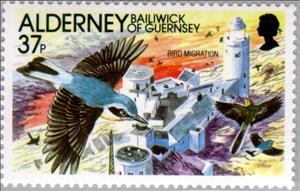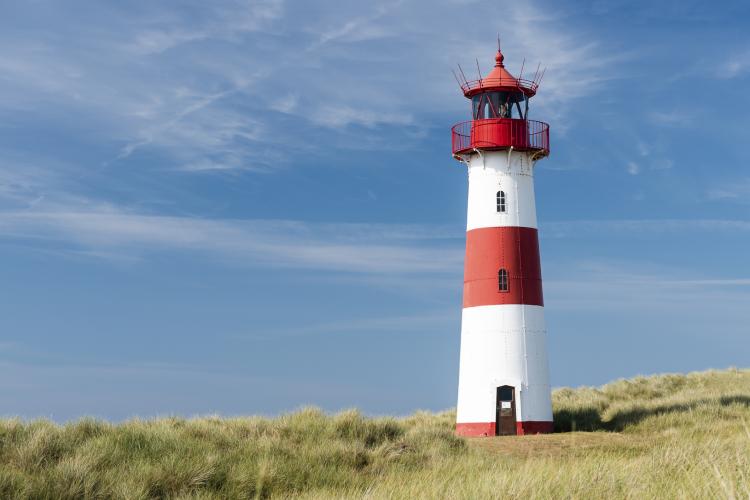Stamp: Migrating Birds over Lighthouse (Alderney 1991)
Migrating Birds over Lighthouse (Alderney 1991)
30 April (Alderney ) within release Automation of the Casquets Lighthouse goes into circulation Stamp Migrating Birds over Lighthouse face value 37 Guernsey penny
| Stamp Migrating Birds over Lighthouse in catalogues | |
|---|---|
| Michel: | Mi:GG-AL 52 |
| Stanley Gibbons: | Sg:GG-AL 50 |
Stamp is horizontal format.
Also in the issue Automation of the Casquets Lighthouse:
- Stamp - Wreck of H. M. S. Victory, 1744 face value 21;
- Stamp - Lighthouse Keepers daughter rowing to Casquets face value 26;
- Stamp - MBB-Bolkow Bo 105D Helicoptor face value 31;
- Stamp - Migrating Birds over Lighthouse face value 37;
- Stamp - Trinity House Vessel 'Patricia' & Arms face value 50;
Stamp Migrating Birds over Lighthouse it reflects the thematic directions:
A lighthouse is a tower, building, or other type of structure designed to emit light from a system of lamps and lenses, and to serve as a navigational aid for maritime pilots at sea or on inland waterways. Lighthouses mark dangerous coastlines, hazardous shoals, reefs, and safe entries to harbors, and can assist in aerial navigation. Once widely used, the number of operational lighthouses has declined due to the expense of maintenance and use of electronic navigational systems.
Birds (Aves), a subgroup of Reptiles, are the last living examples of Dinosaurs. They are a group of endothermic vertebrates, characterised by feathers, toothless beaked jaws, the laying of hard-shelled eggs, a high metabolic rate, a four-chambered heart, and a strong yet lightweight skeleton. Birds live worldwide and range in size from the 5 cm (2 in) bee hummingbird to the 2.75 m (9 ft) ostrich. They rank as the class of tetrapods with the most living species, at approximately ten thousand, with more than half of these being passerines, sometimes known as perching birds. Birds are the closest living relatives of crocodilians.
Animals are multicellular, eukaryotic organisms of the kingdom Animalia (also called Metazoa). All animals are motile, meaning they can move spontaneously and independently, at some point in their lives. Their body plan eventually becomes fixed as they develop, although some undergo a process of metamorphosis later on in their lives. All animals are heterotrophs: they must ingest other organisms or their products for sustenance.



